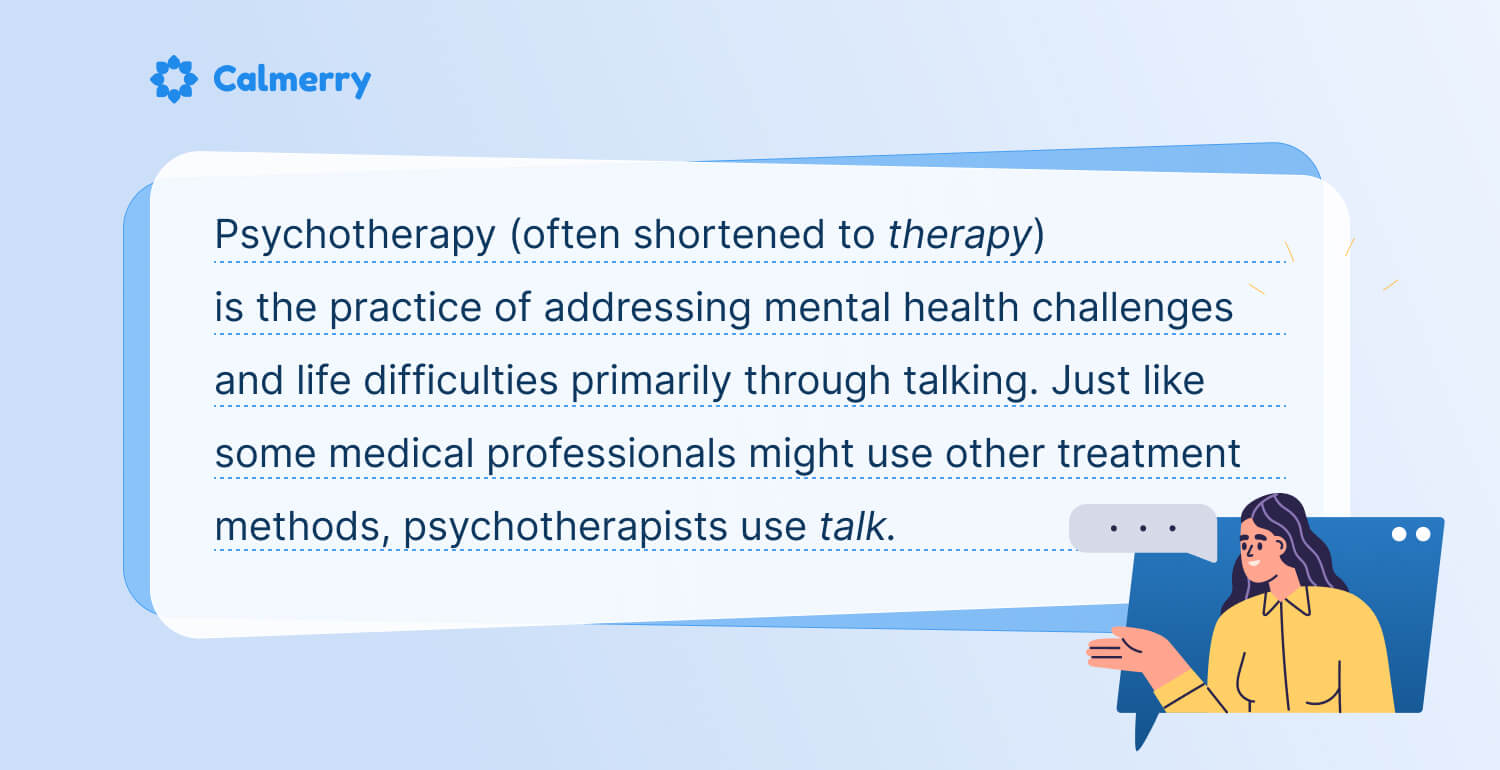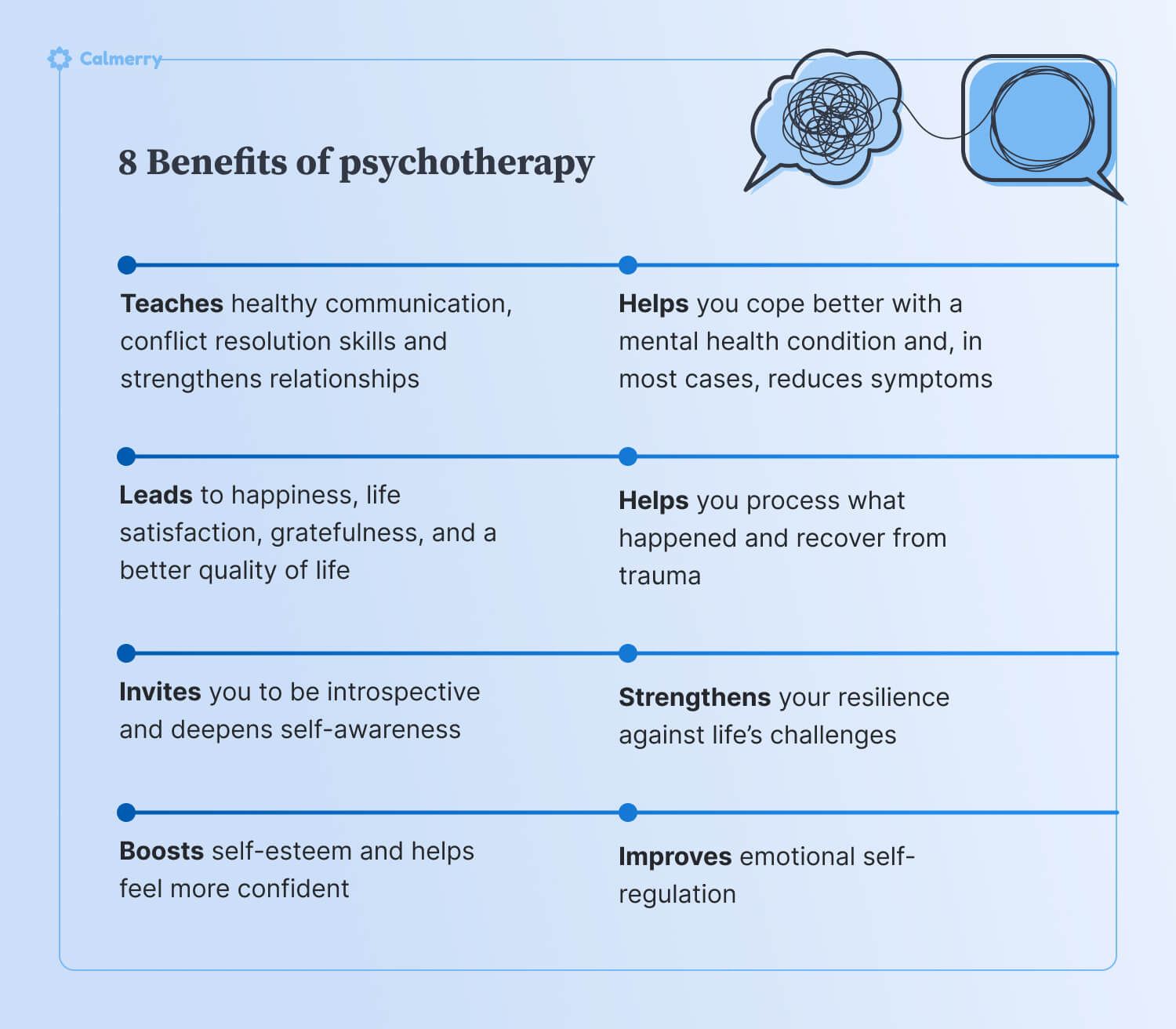The Benefits of Psychotherapy: Is It Truly Helpful for Everyone?

In this article
Thankfully, mental health awareness has come a long way in recent decades. In earlier times, seeing a psychotherapist was something that people were unfairly made to feel ashamed of. But now, we can be open about going to therapy. You may have been to a therapist yourself or know someone who’s told you about their therapy experience.
We now understand that psychotherapy can be helpful for all sorts of issues and life circumstances. Many people seek therapy to treat symptoms of mental illnesses like depression or anxiety. But many others see therapists simply to process life events that all people go through – things like divorce, work stress, identity issues, and more.
You don’t need to be “sick” or in a crisis to benefit from therapy.
– Saya Des Marais, MSW, Therapist-turned-mental health writer
If you’re considering going to therapy for the first time, it’s normal to feel nervous or apprehensive. You might be wondering what the exact benefits of psychotherapy are and whether it’s worth it for you to start.
We at Calmerry think that psychotherapy is 100% worthwhile – but only you can decide for yourself.
Here, we’ll go through 8 evidence-backed benefits of psychotherapy and what you need to consider if you’re looking to start.
What is psychotherapy, and how does it work?
Let’s start with what, exactly, psychotherapy is.
In short, psychotherapy (often shortened to therapy) is the practice of addressing mental health challenges and life difficulties primarily through talking. Just like some medical professionals might use other treatment methods – like an oncologist might use radiation – psychotherapists use talk.
It might seem that therapy has been around forever, but mental health issues haven’t always been treated through psychotherapeutic methods. For example, before the 16th century, mental health symptoms were viewed as religious defects or demonic possessions and were often “treated” by spiritual leaders. [1] Farreras, I. G. (n.d.). History of Mental Illness. Noba. https://nobaproject.com/modules/history-of-mental-illness
Modern psychotherapy is rooted in Sigmund Freud’s psychoanalysis. Although therapy today looks very different from psychoanalysis in the 19th century, Freud was the first person to popularize the idea of talking to a professional to heal.
Today, different types of psychotherapy are used to treat different mental health conditions. Cognitive-behavioral therapy and humanistic therapy are two of the most common methods.
In addition, psychotherapy can be delivered individually, or in a group or family setting.

Who delivers psychotherapy?
Professionals of a few different educational backgrounds can provide psychotherapy. The exact licenses and requirements can differ across states or countries, but in general, you must have completed at least a Master’s degree to legally provide therapy.
Some examples of licenses that you might see when you’re looking for a psychotherapist include:
- PhD or PsyD (doctorate-level psychologist)
- MFT (Masters-level marriage and family therapist)
- LCSW (Masters-level clinical social worker)
- LPC (Masters-level licensed professional counselor)
How does psychotherapy work?
Much of the power of psychotherapy comes from the therapeutic alliance. The therapeutic alliance is the trusting relationship that you and your therapist build together.
Research shows that the stronger the relationship that you have with your therapist, the more effective the psychotherapeutic process is.
Within this therapeutic relationship, psychotherapists can help you by:
- Providing you with a safe, judgment-free space in which to explore your thoughts and feelings
- Helping you see things from another perspective
- Teaching you new skills you can use to manage emotions
- Guiding you to address patterns of thinking and behavior
- Motivating you to change harmful behaviors that may be harming you
- Helping you improve your interpersonal relationships
Therapy works because you and your therapist work together to address issues. It isn’t like other types of therapy (like radiation therapy), where you simply need to receive the treatment. In psychotherapy, you’re expected to be a partner in the treatment process.
Outside of the therapeutic alliance, which is a core aspect of all types of psychotherapy, each psychotherapy method works in different ways.
For example, in cognitive-behavioral therapy, your psychotherapist will help you identify thinking patterns that may be leading you to feel worse. Humanistic psychotherapists may talk to you about who you truly are and who you want to become.
Does psychotherapy work?
Psychotherapy has been around for a long time, and thousands of research studies have been conducted on its effectiveness. Although certain types of therapy are more effective for certain issues and conditions, there is overwhelming consensus among researchers and experts that psychotherapy, overall, is very effective.
Research shows that a majority of people who go through psychotherapy – around 75% – receive some benefit from it. [2] What is Psychotherapy? (n.d.). https://www.psychiatry.org/patients-families/psychotherapy
In many cases, psychotherapy is just as effective as medication for the treatment of mental health conditions. For example, studies have found that cognitive-behavioral therapy is equally effective, and sometimes more so, for treating depression as antidepressant drugs. [3] Boschloo L, Bekhuis E, Weitz ES, Reijnders M, DeRubeis RJ, Dimidjian S, Dunner DL, Dunlop BW, Hegerl U, Hollon SD, Jarrett RB, Kennedy SH, Miranda J, Mohr DC, Simons AD, Parker G, Petrak F, Herpertz S, Quilty LC, John Rush A, Segal ZV, Vittengl JR, Schoevers RA, Cuijpers P. The symptom-specific efficacy of antidepressant medication vs. cognitive behavioral therapy in the treatment of depression: results from an individual patient data meta-analysis. World Psychiatry. 2019 Jun;18(2):183-191. doi: 10.1002/wps.20630.
Research has also found that psychotherapy can change the brain in the same ways as medication. [4] Karlsson, H., MA MD PhD. (2020, November 16). How Psychotherapy Changes the Brain. Psychiatric Times. https://www.psychiatrictimes.com/view/how-psychotherapy-changes-brain
Therapy, especially on its own, may not be appropriate for every single life situation and mental health concern out there. Some more serious mental health concerns, like schizophrenia, may require medication on top of psychotherapy.
But generally, psychotherapy is effective for a great majority of emotional issues.
Benefits of psychotherapy
People who’ve gone to therapy report so many benefits. These benefits aren’t just subjective experiences – they’re also backed by scientific evidence.
Here are 8 research-backed benefits of therapy that you may want to be aware of.

1. Reduces symptoms
Psychotherapy was initially created to treat symptoms of mental health conditions. Today, therapy (or therapy combined with medication) is considered by experts to be the first-line treatment for almost all mental illnesses, including:
- Depression, bipolar disorder, and other mood disorders
- Anxiety disorders
- Obsessive-compulsive disorder (OCD)
- Eating disorders
- Substance use disorder
- Personality disorders
- Post-traumatic stress disorder
- Psychotic disorders
Again – different therapy methods are used for different mental health conditions. But every type of therapy helps you to cope better with the mental health condition and, in most cases, reduces symptoms.
For example, most people with an anxiety disorder experience reduced symptoms after only a few months of therapy. [5] Beyond worry: How psychologists help with anxiety disorders. (2016, October 1). https://www.apa.org. https://www.apa.org/topics/anxiety/disorders One type of therapy called exposure and response prevention is about 80% effective for reducing and even eliminating OCD symptoms. [6] Law C, Boisseau CL. Exposure and Response Prevention in the Treatment of Obsessive-Compulsive Disorder: Current Perspectives. Psychol Res Behav Manag. 2019 Dec 24;12:1167-1174. doi: 10.2147/PRBM.S211117. PMID: 31920413; PMCID: PMC6935308.
2. Helps you recover from trauma
Not only can psychotherapy address symptoms of post-traumatic stress, but it can help you heal from traumatic events even if you don’t have PTSD.
Unfortunately, trauma is a lot more common than you might think; up to 70% of us will experience at least one traumatic event in our lifetimes. [7] National Council for Mental Wellbeing. (2022, February 9). How to Manage Trauma Infographic – National Council for Mental Wellbeing. https://www.thenationalcouncil.org/resources/how-to-manage-trauma-2/ Some people develop symptoms of PTSD, but even if you don’t, that doesn’t mean that the aftermath of the trauma is easy to deal with.
A psychotherapist can help you to process what happened using various forms of trauma therapy. They might help you to retell the story of the trauma so that you come out the victorious survivor or guide you to identify and address some of the irrational thinking patterns that the trauma may have instilled in you.
3. Repairs and strengthens relationships
Psychotherapy, especially couple’s therapy, has been found to help people improve their interpersonal relationships. If you’re having trouble in your relationship (whether it’s a marriage, a family relationship, or a friendship), a therapist could help you get to the root of the trouble and improve it.
Sometimes, this may look like providing a safe and neutral space in which you can both express yourselves. Therapists can also teach healthy communication and conflict resolution skills to help you improve your relationships overall.
Research shows that many forms of couples and relationship therapy are effective. For example, one study found that around 70% of couples benefited from a type of therapy called emotion-focused therapy. [8] Spengler, P. M., Lee, N. A., Wiebe, S. A., & Wittenborn, A. K. (2022). A comprehensive meta-analysis on the efficacy of emotionally focused couple therapy. Couple and Family Psychology: Research and Practice. Advance online publication. https://doi.org/10.1037/cfp0000233
4. Makes you more resilient
There’s no denying it – life can get tough. Although there may not always be a way to make life easier, there is a way to strengthen your resilience against life’s challenges.
Being resilient means that, no matter what comes your way, you’re able to bounce back. It doesn’t mean that life’s hard moments no longer get to you – it just means that you know that you can recover from these challenges.
A psychotherapist can help you strengthen your resilience by teaching you coping skills to manage stress or helping you deepen your self-awareness. There are specific psychotherapy methods that are designed to help strengthen resilience as well. [9] Helmreich I, Kunzler A, Chmitorz A, König J, Binder H, Wessa M, Lieb K. Psychological interventions for resilience enhancement in adults. Cochrane Database Syst Rev. 2017 Feb 2;2017(2):CD012527. doi: 10.1002/14651858.CD012527. PMCID: PMC6464102.
5. Improves emotional self-regulation
Self-regulation is, to put it simply, your ability to calm yourself down when your emotions feel overwhelming. When you’re able to self-regulate, you don’t drown in your feelings, no matter how painful they are. They may still hurt, but you can manage them in healthy ways.
Self-regulation is a skill that even children can learn – but, unfortunately, most of us aren’t taught as children. By working with a psychotherapist, you can strengthen your self-regulation skills and learn how to cope with your feelings.
A big part of improving self-regulation is learning how to manage stress, which is another powerful benefit of psychotherapy.
6. Strengthens self-esteem
Low self-esteem can arise from so many different life experiences, especially during childhood. If you have low self-esteem, you might judge yourself very harshly – harsher than you judge other people. You may feel defective or “less than” when you compare yourself with other people or do not have the confidence to express your views.
Psychotherapists can work with you to help you feel more confident. There are different ways a therapist might go about this: for example, they could teach you assertive communication skills so you’re able to say “no.”
Sometimes, just the experience of working with a therapist alone is enough to improve self-esteem. For example, humanistic therapists practice unconditional positive regard and believe in your inherent worth as a person. Being in this type of safe relationship can be very healing for many people.
7. Deepens self-awareness
This may be one of the most important benefits of psychotherapy – it helps you become more self-aware.
In therapy sessions, you spend the entire time focusing inward. Your therapist will ask you questions about you – about how you feel, how you think, and what your past experiences have been like. This is a unique type of relationship; it’s a relationship that focuses only on you.
A good psychotherapist will ask you the right questions to invite you to be introspective and think hard about how certain life experiences have shaped who you are today. They may invite you to think about your values and what kind of life you want to lead.
8. Leads to happiness and a better quality of life
Lastly, psychotherapy can make you a happier person. Research shows that many types of therapy can boost happiness, life satisfaction, gratefulness, and quality of life – even when life is difficult.
For example, in one study, participants with cancer felt increased happiness and pleasure after going through positive psychotherapy. [10] Meibodi RP, Meftagh SD, Shahangian SS. The effect of positive psychotherapy on happiness and character strength in cancer patients. J Educ Health Promot. 2021 Mar 31;10:97. doi: 10.4103/jehp.jehp_595_20. PMID: 34084844; PMCID: PMC8150071.
This doesn’t necessarily mean you’ll leave every therapy session feeling great. Therapy can be hard work, and sometimes, you might feel exhausted or distressed after talking about difficult topics in a session.
Just keep in mind that therapy is an investment; when committed to the larger overall process, most people start to feel better with therapy.
– Saya Des Marais, MSW, Therapist-turned-mental health writer
Psychotherapy can be done online
Although psychotherapy has traditionally been delivered in person, research now shows that online therapy is just as effective. [11] Meredith S. Pescatello, Tyler R. Pedersen & Scott A. Baldwin (2021) Treatment engagement and effectiveness of an internet-delivered cognitive behavioral therapy program at a university counseling center, Psychotherapy Research, 31:5, 656-667, DOI: 10.1080/10503307.2020.1822559 This means that you can access this powerful healing method from the comfort of your own home.
At Calmerry, we have a large and diverse team of licensed psychotherapists who can support you through difficult life experiences or mental health concerns.
You don’t need to wait until you’re experiencing a problem to see a therapist. Psychotherapy can be a great tool to deepen self-awareness, improve your relationships, and experience a better quality of life.
Farreras, I. G. (n.d.). History of Mental Illness. Noba. https://nobaproject.com/modules/history-of-mental-illness
What is Psychotherapy? (n.d.). https://www.psychiatry.org/patients-families/psychotherapy
Boschloo L, Bekhuis E, Weitz ES, Reijnders M, DeRubeis RJ, Dimidjian S, Dunner DL, Dunlop BW, Hegerl U, Hollon SD, Jarrett RB, Kennedy SH, Miranda J, Mohr DC, Simons AD, Parker G, Petrak F, Herpertz S, Quilty LC, John Rush A, Segal ZV, Vittengl JR, Schoevers RA, Cuijpers P. The symptom-specific efficacy of antidepressant medication vs. cognitive behavioral therapy in the treatment of depression: results from an individual patient data meta-analysis. World Psychiatry. 2019 Jun;18(2):183-191. doi: 10.1002/wps.20630.
Karlsson, H., MA MD PhD. (2020, November 16). How Psychotherapy Changes the Brain. Psychiatric Times. https://www.psychiatrictimes.com/view/how-psychotherapy-changes-brain
Beyond worry: How psychologists help with anxiety disorders. (2016, October 1). https://www.apa.org. https://www.apa.org/topics/anxiety/disorders
Law C, Boisseau CL. Exposure and Response Prevention in the Treatment of Obsessive-Compulsive Disorder: Current Perspectives. Psychol Res Behav Manag. 2019 Dec 24;12:1167-1174. doi: 10.2147/PRBM.S211117. PMID: 31920413; PMCID: PMC6935308.
National Council for Mental Wellbeing. (2022, February 9). How to Manage Trauma Infographic – National Council for Mental Wellbeing. https://www.thenationalcouncil.org/resources/how-to-manage-trauma-2/
Spengler, P. M., Lee, N. A., Wiebe, S. A., & Wittenborn, A. K. (2022). A comprehensive meta-analysis on the efficacy of emotionally focused couple therapy. Couple and Family Psychology: Research and Practice. Advance online publication. https://doi.org/10.1037/cfp0000233
Helmreich I, Kunzler A, Chmitorz A, König J, Binder H, Wessa M, Lieb K. Psychological interventions for resilience enhancement in adults. Cochrane Database Syst Rev. 2017 Feb 2;2017(2):CD012527. doi: 10.1002/14651858.CD012527. PMCID: PMC6464102.
Meibodi RP, Meftagh SD, Shahangian SS. The effect of positive psychotherapy on happiness and character strength in cancer patients. J Educ Health Promot. 2021 Mar 31;10:97. doi: 10.4103/jehp.jehp_595_20. PMID: 34084844; PMCID: PMC8150071.
Meredith S. Pescatello, Tyler R. Pedersen & Scott A. Baldwin (2021) Treatment engagement and effectiveness of an internet-delivered cognitive behavioral therapy program at a university counseling center, Psychotherapy Research, 31:5, 656-667, DOI: 10.1080/10503307.2020.1822559
online therapy
live video session



